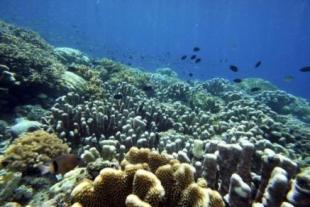 The world’s coral reefs could be wiped out by 2050 unless urgent action is taken to stop threats posed to the “rainforests of the sea” by everything from overfishing to climate change, a report warned Wednesday.
The world’s coral reefs could be wiped out by 2050 unless urgent action is taken to stop threats posed to the “rainforests of the sea” by everything from overfishing to climate change, a report warned Wednesday.
Warmer seas caused by global warming; ocean acidification blamed on carbon dioxide pollution; shipping, overfishing, coastal development and agricultural runoff all pose a threat to coral reefs, which hundreds of millions of people depend on for a living, says the report.
“Threats on land, along the coast and in the water are converging in a perfect storm of threats to reefs,” Jane Lubchenco, administrator of the National Oceanic and Atmospheric Administration (NOAA), said at a news conference in Washington to launch the “Reefs at Risk Revisited” report.
According to the report, which follows on from an earlier study on the health of the world’s coral reefs, more than 90 percent of reefs will be threatened by 2030 and nearly all reefs will be at risk by 2050 unless action is taken now to reduce the threats.
“Local pressures” on reefs, including overfishing, coastal development and pollution, pose the most immediate and direct threats to the world’s reefs, threatening more than 60 percent of the colorful sea ecosystems.
The impacts of climate change — a “global threat” to reefs — is compounding the local pressures.
“Warming seas have already caused widespread damage to reefs, with high temperatures driving a stress response called coral bleaching, where corals lose their colorful symbiotic algae, exposing their white skeletons,” the report says.
“In addition, increasing carbon dioxide (CO2) emissions are slowly causing the world’s oceans to become more acidic. Ocean acidification reduces coral growth rates and, if unchecked, could reduce their ability to maintain their physical structure.”
Quick, broad action could go a long way to saving the reefs, which have shown themselves in the past to be highly resilient, said Lauretta Burke, a lead author of the report, which was compiled by more than two dozen conservation and research groups led by World Resources International (WRI).
A future with dying or dead reefs is “not a future we are committed to,” Burke said.
She urged global policymakers to take rapid action to improve marine management, reduce local threats, especially overfishing, and — crucially — cut greenhouse gas emissions.
If no effort is made to stop the threats to the reefs, and they are lost, the daily livelihoods of 500 million people worldwide would be threatened, many of them in developing nations in southeast Asia and the Indian Ocean, said Lubchenco.
There would be fewer nurseries for commercial fish species, and shorelines would lose some protection from storms.
Coastal communities would lose an important source of protein and food security, not to mention revenues from tourists who travel to countries to visit their reefs and the “beautiful white sand beaches found throughout the tropics,” which wouldn’t be there without coral reefs, said Burke.




